Alan Watts was a British philosopher known for bringing Eastern philosophy to the West.
Born in 1915 in England he was influenced by various spiritual authors and Eastern wisdom.
Watts moved to the U.S. and became an important member of the London Buddhist Lodge.
He published many books including “The Way of Zen” and “The Joyous Cosmology” exploring topics like cybernetics semantics and religion.
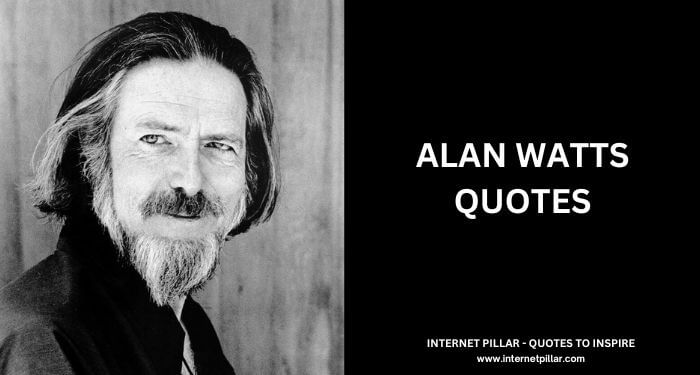
Watts also had a successful radio career discussing diverse subjects such as arts education and sexuality.
His work continues to inspire people seeking spiritual and philosophical insights.
Here are some powerful quotes by Alan Watts.
Best Alan Watts Quotes
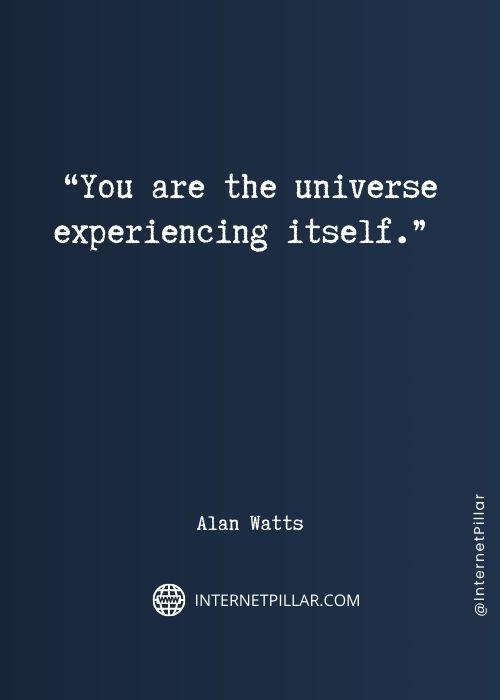
1. “You are the universe experiencing itself.” ~ (Alan Watts).

2. “Muddy water is best cleared by leaving it alone.” ~ (Alan Watts).

3. “This is the real secret of life – to be completely engaged with what you are doing in the here and now. And instead of calling it work, realize it is play.” ~ (Alan Watts).

4. “No amount of anxiety makes any difference to anything that is going to happen.” ~ (Alan Watts).

5. “Don’t hurry anything. Don’t worry about the future. Don’t worry about what progress you’re making. Just be entirely content to be aware of what is.” ~ (Alan Watts).
6. “The meaning of life is just to be alive. It is so plain and so obvious and so simple. And yet, everybody rushes around in a great panic as if it were necessary to achieve something beyond themselves.” ~ (Alan Watts).

7. “Waking up to who you are requires letting go of who you imagine yourself to be.” ~ (Alan Watts).
8. “Better to have a short life that is full of what you like doing than a long life spent in a miserable way.” ~ (Alan Watts).

9. “A person who thinks all the time has nothing to think about except thoughts. So he loses touch with Reality, and lives in a world of illusion.” ~ (Alan Watts).
10. “When a man no longer confuses himself with the definition of himself that others have given him, he is at once universal and unique.” ~ (Alan Watts).
Top Alan Watts Quotes
11. “All that you see out in front of you is how you feel inside your head.” ~ (Alan Watts).
12. “Man suffers only because he takes seriously what the gods made for fun.” ~ (Alan Watts).
13. “The only way to make sense out of change is to plunge into it, move with it, and join the dance.”
14. “Stop measuring days by degree of productivity and start experiencing them by degree of presence.” ~ (Alan Watts).
15. “The future is a concept, it doesn’t exist. There is no such thing as tomorrow. There never will be, because time is always now. That’s one of the things we discover when we stop talking to ourselves and stop thinking. We find there is only present, only an eternal now.” ~ (Alan Watts).

16. “To have faith is to trust yourself to the water. When you swim you don’t grab hold of the water, because if you do you will sink and drown. Instead you relax, and float.” ~ (Alan Watts).
17. “Through our eyes, the universe is perceiving itself. Through our ears, the universe is listening to its harmonies. We are the witnesses through which the universe becomes conscious of its glory, of its magnificence.” ~ (Alan Watts).
18. “So many people of wealth understand much more about making and saving money than about using and enjoying it. They fail to live because they are always preparing to live.” ~ (Alan Watts).
19. “Paradoxical as it may seem, the purposeful life has no content, no point. It hurries on and on, and misses everything. Not hurrying, the purposeless life misses nothing, for it is only when there is no goal and no rush that the human senses are fully open to receive the world.” ~ (Alan Watts).
20. “Hurrying and delaying are alike ways of trying to resist the present.” ~ (Alan Watts).

21. “Real religion is the transformation of anxiety into laughter.” ~ (Alan Watts).
22. “You can’t live at all unless you can live fully now.” ~ (Alan Watts).
23. “To go out of your mind at least once a day is tremendously important. By going out of your mind, you come to your senses.” ~ (Alan Watts).
Famous Alan Watts Quotes
24. “That’s a waste of time. If you really understand Zen. You can use any book. You could use the Bible. You could use Alice in Wonderland. You could use the dictionary, because… the sound of the rain needs no translation.” ~ (Alan Watts).
25. “For there is never anything but the present, and if one cannot live there, one cannot live anywhere.” ~ (Alan Watts).
26. “When you get free from certain fixed concepts of the way the world is, you find it is far more subtle, and far more miraculous, than you thought it was.” ~ (Alan Watts).
27. “You and I are all as much continuous with the physical universe as a wave is continuous with the ocean.” ~ (Alan Watts).
28. “Zen is a way of liberation, concerned not with discovering what is good or bad or advantageous, but what is.” ~ (Alan Watts).
29. “You are an aperture through which the universe is looking at and exploring itself.” ~ (Alan Watts).
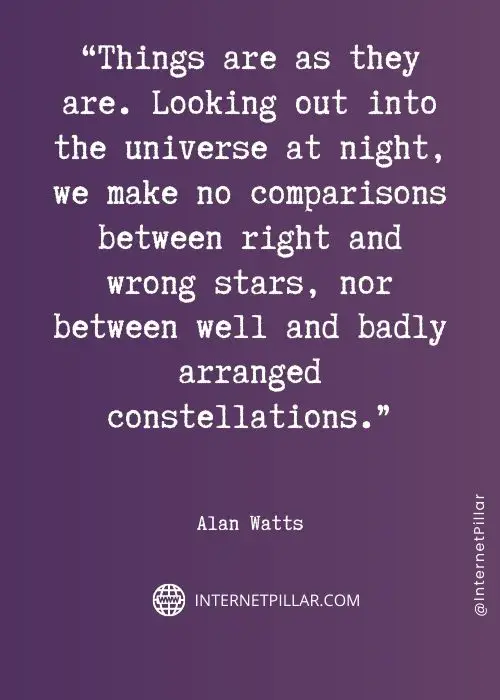
30. “Things are as they are. Looking out into the universe at night, we make no comparisons between right and wrong stars, nor between well and badly arranged constellations.” ~ (Alan Watts).
31. “You are a function of what the whole universe is doing in the same way that a wave is a function of what the whole ocean is doing.” ~ (Alan Watts).
32. “Try to imagine what it will be like to go to sleep and never wake up. Now try to imagine what it was like to wake up having never gone to sleep.” ~ (Alan Watts).
33. “Nirvana is where you are, provided you don’t object to it.” ~ (Alan Watts).
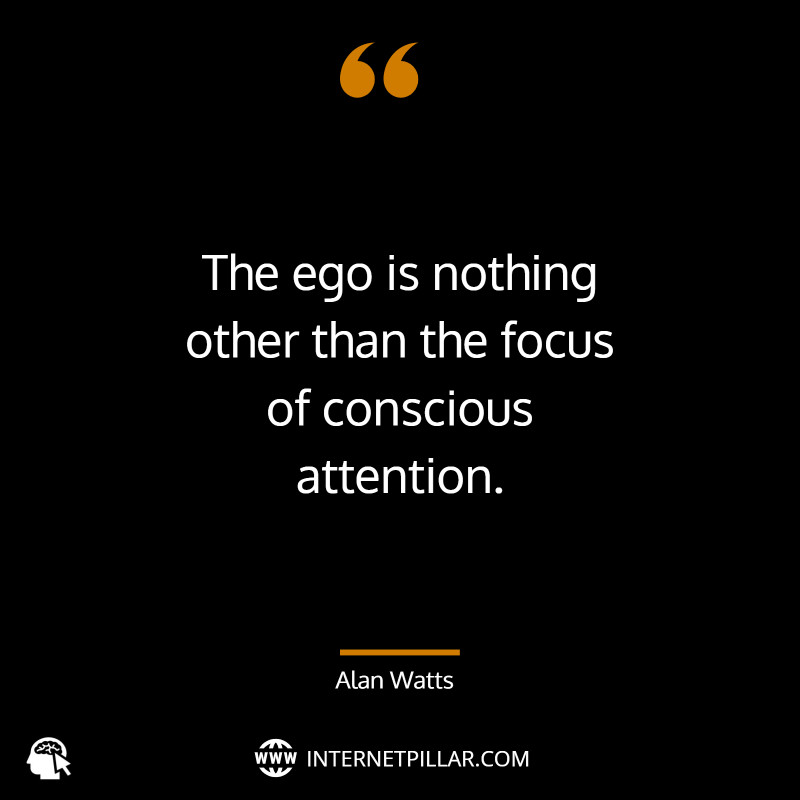
34. “The ego is nothing other than the focus of conscious attention.” ~ (Alan Watts).
35. “The truth is revealed by removing things that stand in its light, an art not unlike sculpture, in which the artist creates, not by building, but by hacking away.” ~ (Alan Watts).
36. “Meditation is the discovery that the point of life is always arrived at in the immediate moment.” ~ (Alan Watts).
37. “We cannot be more sensitive to pleasure without being more sensitive to pain.” ~ (Alan Watts).
Short Alan Watts Quotes
38. “Trying to define yourself is like trying to bite your own teeth.” ~ (Alan Watts).
39. “The more a thing tends to be permanent, the more it tends to be lifeless.” ~ (Alan Watts).
40. “We get such a kick out of looking forward to pleasures and rushing ahead to meet them that we can’t slow down enough to enjoy them when they come.” ~ (Alan Watts).
41. “Stay in the center, and you will be ready to move in any direction.” ~ (Alan Watts).

42. “Never pretend to a love which you do not actually feel, for love is not ours to command.” ~ (Alan Watts).
43. “We know that from time to time there arise among human beings people who seem to exude love as naturally as the sun gives out heat.” ~ (Alan Watts).
44. “When we attempt to exercise power or control over someone else, we cannot avoid giving that person the very same power or control over us.” ~ (Alan Watts).
45. “Problems that remain persistently insoluble should always be suspected as questions asked in the wrong way.” ~ (Alan Watts).
46. “We usually don’t look. We overlook.” ~ (Alan Watts).
47. “You are the big bang, the original force of the universe, coming on as whoever you are.” ~ (Alan Watts).
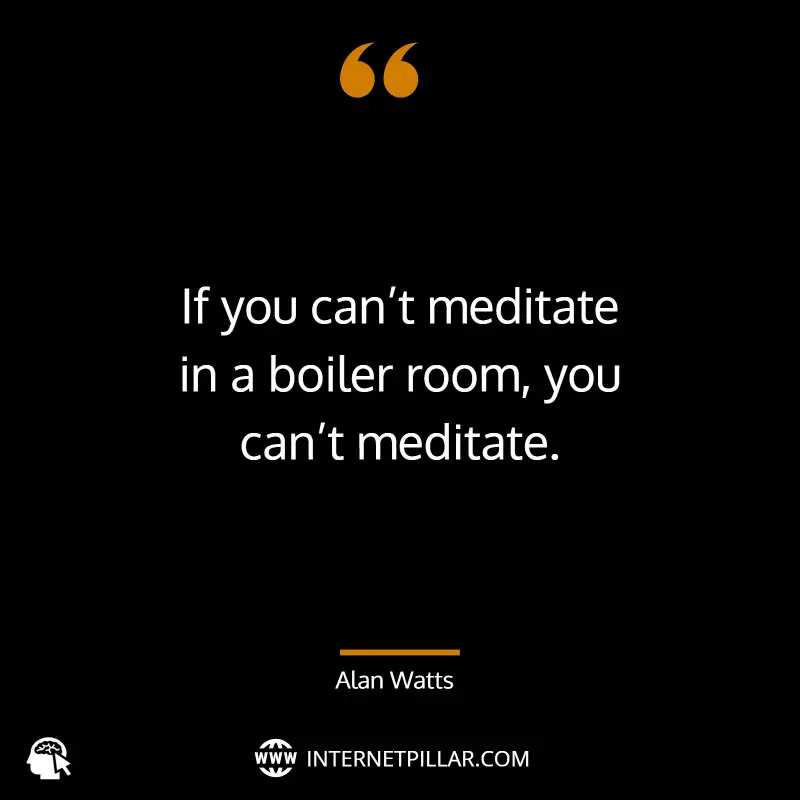
48. “If you can’t meditate in a boiler room, you can’t meditate.” ~ (Alan Watts).
49. “It’s time to question a job or career move when it seems like most energy is devoted to making things appear other than what they really are.” ~ (Alan Watts).
50. “The soul is something which contains the body. The body doesn’t contain the soul. The soul, if we put it into modern language, is the entire complex of relationships in whose context this organism exists.” ~ (Alan Watts).
Inspiring Alan Watts Quotes
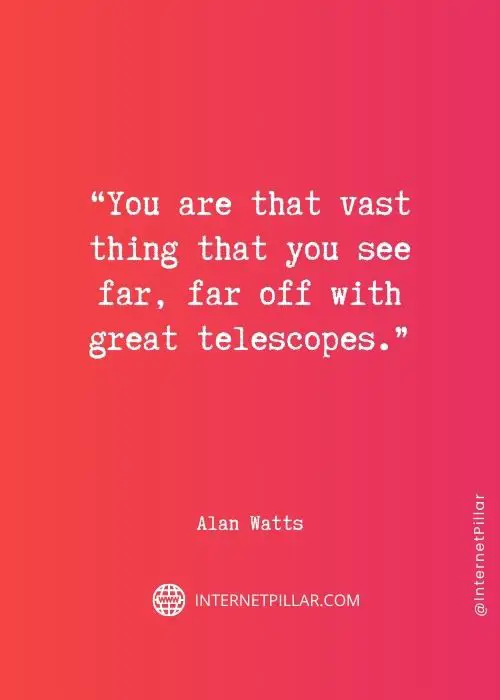
51. “You are that vast thing that you see far, far off with great telescopes.” ~ (Alan Watts).
52. “Imagine a multidimensional spider’s web in the early morning covered with dew drops. And every dew drop contains the reflection of all the other dew drops. And, in each reflected dew drop, the reflections of all the other dew drops in that reflection. And so ad infinitum. That is the Buddhist conception of the universe in an image.” ~ (Alan Watts).
53. “How is it possible that a being with such sensitive jewels as the eyes, such enchanted musical instruments as the ears, and such fabulous arabesque of nerves as the brain can experience itself anything less than a god.” ~ (Alan Watts).
54. “But the attitude of faith is to let go, and become open to truth, whatever it might turn out to be.” ~ (Alan Watts).

55. “Nothing satisfies an individual incapable of enjoyment.” ~ (Alan Watts).
56. “But at any rate, the point is that God is what nobody admits to being, and everybody really is.” ~ (Alan Watts).
Alan Watts Quotes for Motivation
57. “But to me nothing – the negative, the empty – is exceedingly powerful.” ~ (Alan Watts).
58. “Love is not something that is a sort of rare commodity, everybody has it.” ~ (Alan Watts).
59. “Everything that happens, everything that I have ever done, everything that anybody else have ever done is part of a harmonious design, that there is no error at all.” ~ (Alan Watts).
60. “The positive cannot exist without the negative.” ~ (Alan Watts).
So these are some of the top Alan Watts Quotes on Love, Change, Happiness and Time. We hope you liked these Quotes by Alan Watts
You Might Like
- Mother Teresa Quotes
- William Shakespeare Quotes
- Abraham Lincoln Quotes
- Kobe Bryant Quotes
- Mahatma Gandhi Quotes
- Ronald Reagan Quotes
- Nelson Mandela Quotes
- Thomas Jefferson Quotes
- Socrates Quotes
- Walt Disney Quotes
Short Biography of Alan Watts
Alan Wilson Watts, an English writer and speaker, was celebrated for making Eastern philosophies like Buddhism, Taoism, and Hinduism accessible to Western audiences.
Working from Berkeley’s KPFA radio, he garnered a following and authored over 25 influential books.
| Full Name | Alan Wilson Watts |
| Born | 6 January 1915 Chislehurst, Kent, England |
| Died | 16 November 1973 (aged 58) Marin County, California, U.S. |
| Alma mater | Seabury-Western Theological Seminary |
| Notable work | Behold the Spirit (1947), The Way of Zen (1957), Tao: The Watercourse Way (1975) |
| Spouses | Eleanor Everett(m. 1938; div. 1949), Dorothy DeWitt(m. 1950; div. 1963), Mary Jane Yates King(m. 1964) |
| Era | 20th-century philosophy |
| Region | Western philosophy |
| School | Zen, Perennialism |
| Institutions | The King’s School Canterbury, American Academy of Asian Studies, California Institute of Integral Studies, San Jose State University |
| Main interests | Aesthetics, Metaphysics, Mysticism, Philosophy of life, Philosophy of mind, Philosophy of religion, Philosophy of self, Psychology, Theology |
| Website | alanwatts.org |
His works, such as “The Way of Zen” and “Psychotherapy East and West,” played a key role in the hippie movement and explored themes like human consciousness and psychedelics.
Watts’s teachings continue to resonate, enjoying widespread posthumous popularity through platforms like YouTube and Spotify.
Quick Facts about Alan Watts
- Alan Watts was born on January 6, 1915, in Chislehurst, Kent, now part of southeast London.
- He grew up as an only child in a middle-class family.
- Watts’s father worked for the Michelin tyre company, and his mother was a housewife with a missionary background.
- During his childhood, Watts developed an interest in mystical and religious concepts.
- He was academically proficient and attended The King’s School, Canterbury.
- Watts was influenced by the landscape paintings and artworks from the Far East during his youth.
- At 16, Watts became the secretary of the London Buddhist Lodge.
- He chose Buddhism over Anglican Christianity during his late teens.
- Watts moved to the United States in 1938 and later became a U.S. citizen in 1943.
- He married Eleanor Everett in 1938; they had two daughters before divorcing in 1949.
- Watts wrote extensively, with over 25 books to his credit, focusing on religion, philosophy, and the human experience.
- His notable works include “The Way of Zen” and “Psychotherapy East and West.”
- He was known for popularizing Eastern philosophy in the West, making complex concepts accessible to a broader audience.
- Watts had a stint as a Christian priest before fully embracing Eastern philosophies.
- He worked at the American Academy of Asian Studies in San Francisco.
- Watts began a series of radio programs in the 1950s that became extremely popular and continued to influence audiences posthumously.
- He explored human consciousness and experimented with psychedelics, which influenced his writings and lectures.
- Watts’s interest in patterns found in nature was a recurring theme in his work.
- He lectured at multiple universities and was considered a philosophical entertainer rather than a formal academic.
- Watts’s lectures and seminars were broadcasted across various radio stations, and they continue to be aired today.
- He was critical of both Western and Eastern institutional religions, favoring a more individualistic approach to spirituality.
- Watts had a profound influence on the 1960s counter-culture and the environmental movement.
- His later years were spent in Druid Heights, a community in California, where he continued to write and lecture.
- Watts planned his own passing, which occurred on November 16, 1973, from a heart condition.
- He was cremated and his ashes were divided between Druid Heights and the Green Gulch Monastery.
- Watts was survived by seven children from three marriages and continued to have a lasting impact through his extensive body of work.
- His works emphasize the interconnectedness of humanity and the universe, advocating a deeper understanding of self and environment.
- He often discussed the illusory nature of the ego and advocated for a greater integration of aesthetic values into American life.
- Watts’s exploration of the divine reality touched on the contradictions and dualities inherent in life and spirituality.
- Throughout his life, Watts was a bridge between East and West, ancient and modern, culture and nature.
Top Questions about Alan Watts
A: Alan Watts argued that Buddhism could be thought of as a form of psychotherapy.
A: Alan Watts considered “Nature, Man and Woman” to be his best book from a literary perspective.
A: Alan Watts worked as a volunteer programmer at the KPFA radio station in Berkeley.
A: He wrote over 25 books and articles, making complex Eastern philosophies accessible to Western audiences through works like “The Way of Zen.”
A: Watts grew up in a middle-class, pastoral environment, which spurred his early interest in nature and ultimately in spiritual and mystical concepts.
A: His lectures gained posthumous popularity on public radio in California and New York, and more recently on the internet, including platforms like YouTube and Spotify.
A: Alan Watts attended The King’s School, Canterbury, where he botched an opportunity for a scholarship to Oxford.
A: Watts became the secretary at the London Buddhist Lodge at the age of 16.
A: Alan Watts experienced a mystical dream while ill with a fever as a child, which had a profound impact on his spiritual direction.
A: The clarity, transparency, and spaciousness of Chinese and Japanese art deeply influenced Watts, emphasizing the participatory relationship between people and nature, a theme persistent in his later works.



